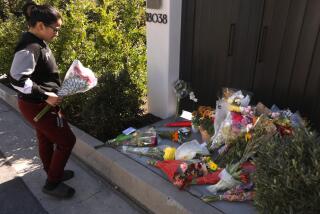Patriots Admit Having ‘Serious Drug Problems’
- Share via
BOSTON — At least five New England Patriots have a serious drug problem and five to seven more are suspected of having a problem, Coach Raymond Berry told The Boston Globe in a copyright interview in today’s editions.
“I would say we may be 28th in the league as far as this problem goes, but there are at least five players we know who have a serious problem and five to seven more whom we suspect very strongly,” Berry said.
The identifications of the players, who Berry said include at least four starters, were not released.
“We have a situation that exists here that we feel is intolerable. It has been going on for a year, and I had to weigh the damages of doing something about it immediately by going public,” Berry said.
“We felt with the season going the way it had, we had to keep our eye on the bull’s-eye. That’s why we didn’t do anything before. But our bull’s-eye looking is over,” Berry said Monday, a day after the Patriots’ 46-10 Super Bowl loss to the Chicago Bears.
“It’s time to do something about this problem, and it cannot be done in secret,” Berry said.
After being addressed Monday in New Orleans by Berry about the extent of the problem--specifically, the use of cocaine, the Globe said--and the possible consequences, the team members huddled for nearly two hours in their hotel with player representative Brian Holloway and his assistant, Ron Wooten.
At the meeting, members of the American Football Conference champions voted to become the first NFL team to accept voluntary drug testing, the Globe and other sources said. Of 59 players on the roster, seven voted against the plan. Several abstained, the Globe said.
Berry was asked when the team returned at 11 p.m. Monday night to Logan International Airport if any players were going to be suspended as a result of the problem.
“Not necessarily. All of us understand what the world is about today. It’s just something we have to deal with,” he said.
Before the vote for drug testing, injured defensive end Kenneth Sims spoke forcefully in favor of the voluntary plan, the Globe said.
“I just said that people’s lives were more important than football,” Sims said. “I tried to speak from my heart. These things cause so many problems at home and in your life. We have to face it and we have to do something about it.”
Among the seven in opposition to the plan were Holloway and Wooten, both of whom opposed the testing on collective bargaining grounds.
The National Football League Players Assn., the players’ union, has long opposed spot testing or any type of urinalysis examination for drug use except in cases where the team physician perceives an individual problem or a player has previously tested positive.
Eight NFL teams requested that their players take postseason drug tests this year, and all refused until the Patriots announced their compliance with Berry’s request.
“Many of the players involved are ones with important roles on this team. We can’t afford to lose them. We don’t want to see players traded because of a drug problem,” Wooten said.
“We also didn’t want our season tainted by the actions of a few players, and to be honest, most of us were shocked to learn the extent of the problem. We all thought it was just a very few players. I’m flabbergasted.
“What we decided to adopt was a voluntary drug-testing program that will be regular and frequent enough to prevent anyone from slipping through undetected. The key is that this is a personal agreement between this specific group of players, (General Manager) Patrick (Sullivan) and Raymond.
“It’s not a stance taken by the Patriots, and it will only be in effect as long as Raymond is the coach and the Sullivans are the management,” Wooten said.
Wooten said a review board of players would be set up to evaluate any player who has a problem, and a course of action would be recommended.
However, Berry said he was of the opinion that once a player was “cleaned up,” any recurrence of a drug problem would result in immediate suspension for a year without pay.
“I would hope there would be no casualties, but I am not naive,” Berry told the Globe two weeks ago when he was first questioned about the team’s drug problem.
“I started working on this last January (1985). I went to see all 59 of our players then, and 58 of them agreed that a voluntary program might be a good idea. But since that time, we have had several players who we had cleaned up backslide,” Berry said.
“I had to make a difficult decision with some of them because I told them all along that if I ever pulled someone out of the starting lineup because of drugs, I would not lie for them,” Berry said.
“But I was also aware that if this became public, it would dominate all other issues, including our upcoming (playoff) games. Because of that, I did nothing until the season ended.
“I have told the players what the penalties are and the way I feel about this. I do not make many rules, but the ones I make, I enforce.”
Most of the 12 players involved, many of whom were confronted by Berry after a party in which drugs were used after the team’s 30-27 loss to the Miami Dolphins in December, voted in favor of the voluntary plan, according to Wooten.
Several starting players were again confronted in Miami before the AFC championship game and warned that they were being watched and that the Miami police “would like nothing better than to bust a New England Patriot,” Berry said.
That did not occur, but after the loss in the Super Bowl, Berry had had enough.
“The point is not that you are having to prove you’re innocent (by testing),” Berry said. “The point is that there are obviously some young lives being ruined by drugs, and no one, neither the league nor the union, has the guts to do anything about it.
More to Read
Go beyond the scoreboard
Get the latest on L.A.'s teams in the daily Sports Report newsletter.
You may occasionally receive promotional content from the Los Angeles Times.










